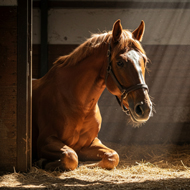
Breeders are encouraged to maximise turnout whenever possible.
Thoroughbred foals who spend more time in large pastures and weaned later in life are more likely to race, compete more often and earn more prize money, according to new research.
The study by the Royal Veterinary College (RVC) followed 129 thoroughbred foals born between 2019 and 2020 on six stud farms. Researchers gathered data on maternal health, foal health and race performance up to the age of four.
They found that foals that spent more time turned out at pasture in the first six months of life, and foals that were weaned at an older age, were more likely to race at least once by the end of their fourth year of life.
Furthermore, the older the foals were at weaning, the greater number of race stats they made, and foals that were turned out in larger paddocks during the first six months of life earned more prize money.
The study, published in the Equine Veterinary Journal, is the first of its kind to link early-life conditions with long-term race performance.
It suggests that the first six months of life is a critical period of development in Thoroughbreds. Breeders are therefore encouraged to maximise turnout whenever possible, and to consider weaning after this critical period.
Dr Rebecca Mouncey, veterinary surgeon and post-doctoral research fellow at the RVC, said: “This study is the first of its type to evaluate the effect of early-life experiences on later-life performance in Thoroughbred racehorses, providing important novel findings that can be directly applied at the stud farm level to reduce wastage and improve performance in this population.
“Our findings highlight that the first six months of life are a critical period of development in Thoroughbreds, during which we must be mindful to ensure that our management practices provide sufficient opportunity for positive tissue adaptation and optimise development.”
Image (C) RVC.



 Zoetis UK has called on horse owners to complete a short online survey about their horse's behaviours.
Zoetis UK has called on horse owners to complete a short online survey about their horse's behaviours.